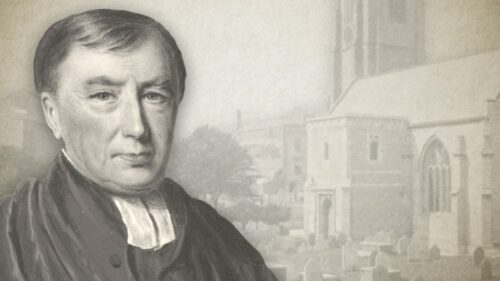
October 23—Morning Devotion
“Now therefore go, and I will be with thy mouth, and teach thee what thou shalt say.”—Exodus 4:12
My soul, pause over this sweet promise which the Lord gave to Moses; for surely the same is in effect said to every minister, every child of God, and every believer. He that made man’s mouth, will give every thing suitable to the mouth, and proportion every thing to the necessity of his people. And do, my soul, remark the comprehensiveness of the promise. Will not He who undertakes to be with the mouth, be also with all the renewed faculties of the soul? Jesus gives the tongue of the learned. Jesus gives grace to the lips, understanding to the heart, eyes to the blind, feet to the lame: the bread shall be given, and the water shall be sure, and the defence shall be the mountains of rocks. Go then, my soul, go wheresoever the Lord leads: for he saith, “Be not afraid, I am with thee, I am thy. God.” Learn, my soul; then to eye Jesus in all, and depend upon it, Jesus will bless thee in the use of all. Make his glory thy aim, and thy happiness will be his glory.
Robert Hawker (1753-1827) was an Anglican (High-Calvinist) preacher who served as Vicar of Charles Church, Plymouth. John Hazelton wrote of him:
“The prominent features…in Robert Hawker's testimony…was the Person of Christ….Dr. Hawker delighted to speak of his Lord as "My most glorious Christ.” What anxious heart but finds at times in the perusal of the doctor's writings a measure of relief, a softening, and a mellowing? an almost imperceptible yet secret and constraining power in leading out of self and off from the misery and bondage of the flesh into a contemplation of the Person and preciousness of Christ as "the chiefest among ten thousand and the altogether lovely." Christ and Him crucified was emphatically the burden of his song and the keynote of his ministry. He preached his last sermon in Charles Church on March 18th, 1827, and on April 6th he died, after being six years curate and forty-three years vicar of the parish. On the last day of his life he repeated a part of Ephesians 1, from the 6th to the 12th verses, and as he proceeded he enlarged on the verses, but dwelt more fully on these words: "To the praise of His glory Who first trusted in Christ." He paused and asked, "Who first trusted in Christ?" And then made this answer: "It was God the Father Who first trusted in Christ."
Robert Hawker on the Biblical Covenants (Complete)
Robert Hawker's Poor Man's Morning Portions





